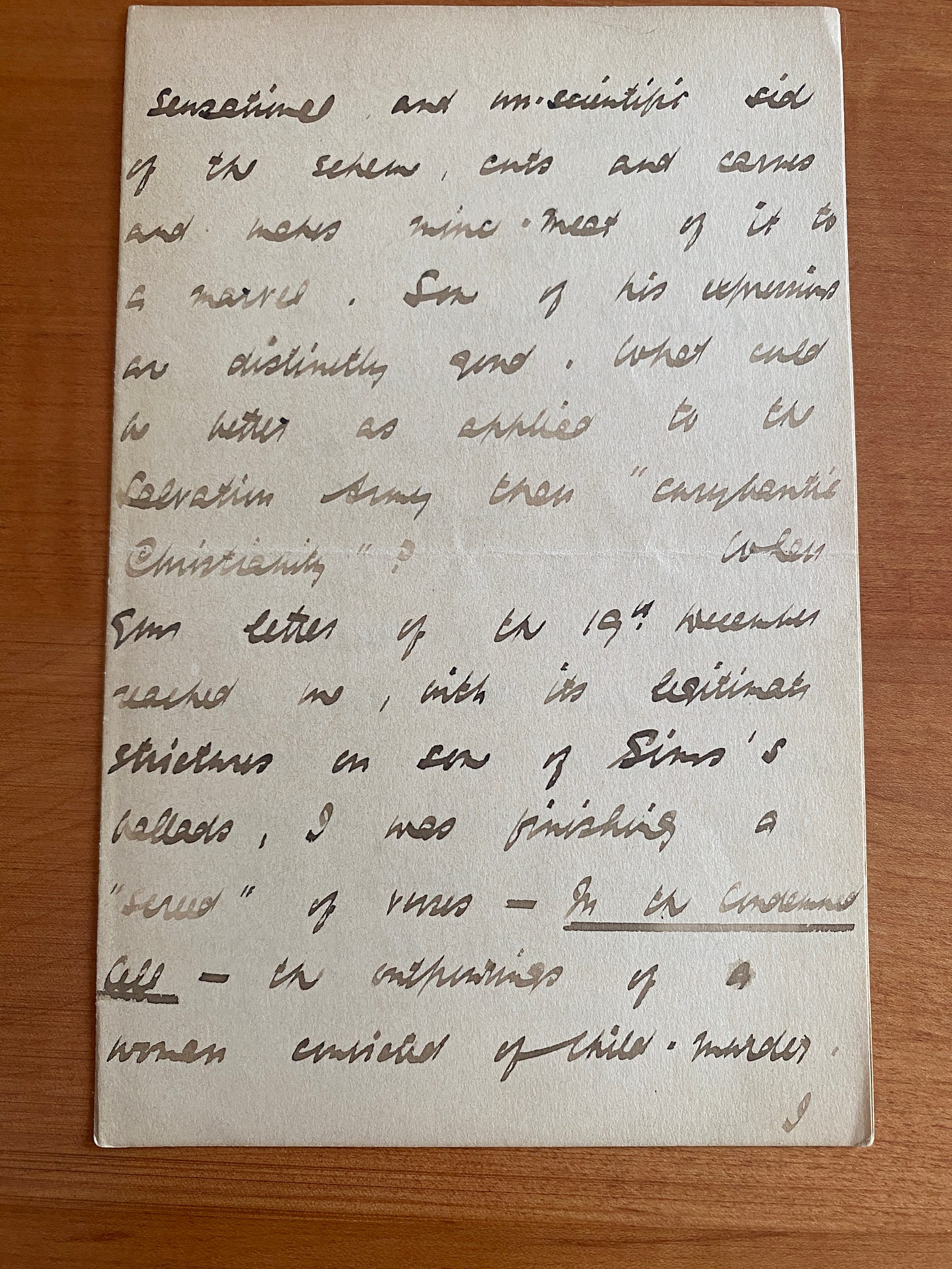1891/1/prior to the 12th: Ebenezer to Agnes
Ebenezer and Agnes began corresponding in autumn, 1890, but this is the first surviving letter--for now anyway. The first few pages are missing, but it is just after the New Year.
…sensational and un-scientific side of the scheme, cuts and carves and makes mince-meat of it to a marvel. Some of his expressions are distinctly good. What could be better as applied to the Salvation Army than “corybantic Christianity”1?
When your letter of the 19th December reached me, with its legitimate strictness on some of Sims’s ballads2, I was finishing a “screed” of verses--In the Condemned Cell--the outpourings of a woman convicted of child-murder. I intended in these verses to draw attention to a glaring de::fect in the English com-law3, and send the production to Blackwood’s Magazine4, but your criticism has frightened me so far as these verses are con::cerned into inaction! You see what an influence you are! Some fractionlets of recent verse I shall send you some of these January days.
Since the holidays began I have been wonderfully busy, and now that, so far as my own work is concerned, I am getting the rope tight I intend to keep it so. M. Taine’s somewhat materialistic English Literature5 I am going through carefully and critically, with extensive readings in French and German generally. By the way, if you have your copy of Helen Faucit’s Shakes::peare’s Heroines6 at hand, you might let me have it for a little while. I cannot get the book here. I shall handle it reverently and, perhaps, return it to you in person. Is that any inducement to you to send it, I wonder!
The weather still continues mar::vellously wild. In the second morning of the year--the morning of great beauty, temperate and tranquil as the morning of a harvest day--I visited Van Courtland’s bower7 on the Northern side of the Bow. You remember the path out by the poor fellow in the steep bush-clad bank and the rustic seat he has erected among the poplar shoots half way up, where you and I sat and talked of many things one August evening after we returned from the ranch. On this occasion I sat there alone, read the first book of Keats’s Lamia8, and, when I laid down the precious volume, thought of much. All around the arbour of grass, flowers, and bush, was withered and dead, dry and brown as Sahara sands, but the sun shone fair on it all, and I remembered what it had been, and I knew what it would be again.--
Oh would that the heart, like a flower,
Its bloom could renew every year,
That no deed of the Past held its power
The Future no fear!
Ah! That Future. The view from where I sat was memorable. Among the alders below were a few Indian tepees9, the blue smoke curling up from their brown can::vas coverings. At my feet flowed the Bow, blue and storied as the Rhine10, flowing as it has flowed all these thousands of years since a path was cloven11 for it through the mountains, old as Silva’s brook12 itself! On the plateau beyond were the gaudily painted houses of Calgary to last but a little longer than the poor red man’s tepee; and behind them the brown hills, the bastions of the everlasting mountains beyond, their snowy peaks, calm as death, have as disembodied spirits, rising high into the azure of the morning sky, where, like a wraith, hung the waning moon of a dead year. I saw there amid the decay of leaf and grass, and saw it all until the morn sunshine drew up the white vapours of the morn::ing and veiled the mountains from me. “For what is your life? It is ever a vapour that appeareth for a little time, and then vanisheth away.”13 Oh my comrade! how contemptible at times are our ambitions, our joys, our disappointments and very14 sorrows! I am cheered by good news from the old country and from there have had more than what I deserve of kindly greetings and New Year wishes. I trust before long to write to you definitely of some of my plans for the future. I am striving to be--to do--not to talk, and I fear to write to you at random. That beautiful letter from Fern Hill15, with a fragrance as of roses and lilies, has breathed sweet impulses on me, opening up vistas of pleasant shade, pure blossom, and goodly fruit. It would have been perfect had it told of your Aunt be::ing better. Why does she fear for you and Scotland?
I was requested in the be::ginning of last week to or::ganise and manage here a segment of the Chautauqua Literary and Scientific Circle16 --do you know of the organisation?--but I refused the honour on the ground of the uncertainty of my being here any length of time.
Ever Your Faithful Comrade
E. Charlton Black.



